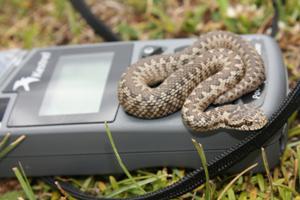Dušan Jelić
Aim of this research is to precisely determine the distribution of Karst Viper and develop an effective protection/monitoring program in Bosnia and Herzegovina. Then this country can join other countries of Dinaric mountains arc in building regional conservation actions.

Karst Viper is endemic and highly endangered snake species that inhabits high mountain areas in Balkans. This Viper is the smallest poisonous snake in Europe and is considered the most threatened one due to very fragmented distribution. We suspect that 60% of all known distribution area of this Viper is found in Bosnia and Herzegovina, but there are no scientific research and conservation efforts in the field. Species is not protected by law, and habitats are being under anthropogenic pressure in enormous rate. Goal of this research is to precisely determine the species distribution and develop an effective protection/monitoring program. Afterwards the continuous monitoring has to be established and for this, Bosnia and Herzegovina will need local experts working together and in cooperation with regional partners. Teams of scientists from Serbia, Macedonia and Croatia have been working together on this highly endangered species for almost a whole decade, following a unique monitoring protocol. Regional cooperation and exchange of information is the base for protection of our natural values and fulfilling of EU protection standards.

Through exchange of scientists, organizing workshops, lectures and publishing educational brochures we hope to strengthen regional cooperation and reduce the past war consequences.
During the project we plan to make a promotional lectures at the University of Sarajevo, Banja Luka and Mostar to get students involved and invite them to a 3 day training in Zelengora National Park. We will train them to be able to join the project and later to be able to continue with the monitoring.
We also plan to investigate new possible mountain localities that have favourable habitats for Karst Viper (high-mountain grasslands). There are 16 mountains that will be investigated and analysed: Jadovnik, Hrbina planina, Šator, Čvrsnica, Bjelasica, Viduša, Ljubuša, Tušnica, Baba planina, Somina, Lelija, Treskavica, Volujak, Velež, Cincar, Orijen.
After this short-term project to start research and monitoring in Bosnia and Herzegovina, we plan to make one large-scale regional project for conservation and monitoring of Karst Viper in the Balkan Peninsula (Croatia, Bosnia and Herzegovina, Serbia, Montenegro, Macedonia and Albania).